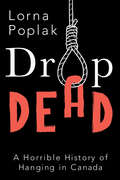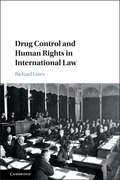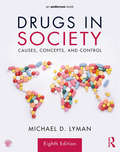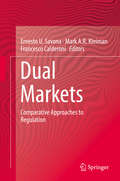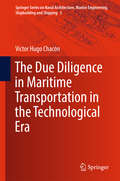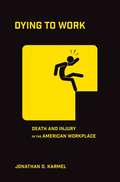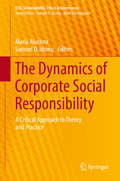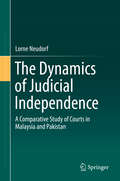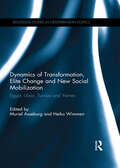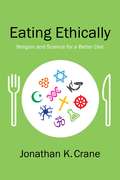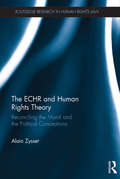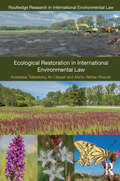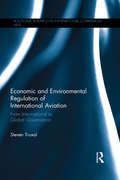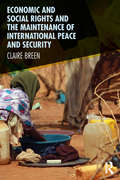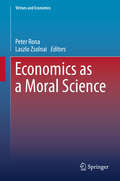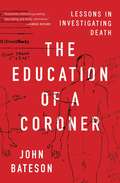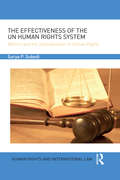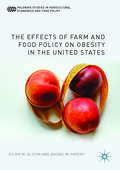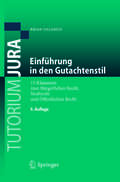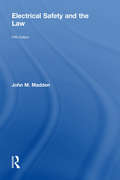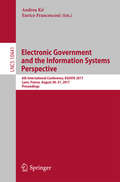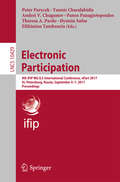- Table View
- List View
Drop Dead: A Horrible History of Hanging in Canada
by Lorna PoplakShining a light on the dark history of hangings in Canada. Take a journey through notable cases in Canada’s criminal justice history, featuring well-known and some less-well-known figures from the past. You'll meet Arthur Ellis, Canada’s most famous hangman, whose work outfit was a frock coat and striped trousers, often with a flower pinned to his lapel. And you will also encounter other memorable characters, including the man who was hanged twice and the gun-toting bootlegger who was the only woman every executed in Alberta. <p><p> Drop Dead: A Horrible History of Hanging in Canada illustrates how trial, sentencing, and punishment operated in Canada’s first century, and examines the relevance of capital punishment today. Along the way, learn about the mathematics and physics behind hangings, as well as disturbing facts about bungled executions and wrongful convictions.
Drug Control and Human Rights in International Law
by Schabas Richard Lines William A. Richard Schabas LinesHuman rights violations occurring as a consequence of drug control and enforcement are a growing concern, and raise questions of treaty interpretation and of the appropriate balancing of concomitant obligations within the drug control and human rights treaty regimes. Tracing the evolution of international drug control law since 1909, this book explores the tensions between the regime's self-described humanitarian aspirations and its suppression of a common human behaviour as a form of 'evil'. Drawing on domestic, regional and international examples and case law, it posits the development of a dynamic, human rights-based interpretative approach to resolve tensions and conflicts between the regimes in a manner that safeguards human rights. Highlighting an important and emerging area of human rights inquiry from an international legal perspective, this book is a key resource for those working and studying in this field.
Drugs in Society: Causes, Concepts, and Control
by Michael D. LymanDrugs in Society: Causes, Concepts, and Control, Eighth Edition, focuses on the many critical areas of America's drug problem, providing a foundation for rational decision-making within this complex and multidisciplinary field. Lyman offers a comprehensive big-picture examination of the US drug problem, dealing with drugs, abusers, drug enforcement, and public policy. Organized in three sections: Understanding the Problem, Gangs and Drugs, and Fighting Back, topics covered include the business of drugs and the role of organized crime in the drug trade, drug legalization and decriminalization, legal and law enforcement strategies, an analysis of the socialization process of drug use and abuse, and a historical discussion of drug abuse that puts the contemporary drug problem into perspective. Suitable for upper-level undergraduates in Criminal Justice, Criminology, and related programs, Drugs in Society, Eighth Edition, uses logical organization and strong pedagogy (case studies, focused text boxes with related information, critical thinking tasks) to support learning objectives.
Dual Markets
by Ernesto U. Savona Mark A.R. Kleiman Francesco CalderoniThis comprehensive volume analyzes dual markets for regulated substances and services, and aims to provide a framework for their effective regulation. A "dual market" refers to the existence of both a legal and an illegal market for a regulated product or service (for example, prescription drugs). These regulations exist in various countries for a mix of public health, historical, political and cultural reasons. Allowing the legal market to thrive, while trying to eliminate the illegal market, provides a unique challenge for governments and law enforcement. Broken down into nine main sections, the book studies comparative international policies for regulating these "dual markets" from a historical, legal, and cultural perspective. It includes an analysis of the markets for psychoactive substances that are illegal in most countries (such as marijuana, cocaine, opiods and amphetimines), psychoactive substances which are legal in most countries and where consumption is widespread (such as alcohol and tobacco), and services that are generally regulated or illegal (such as sports betting, the sex trade, and gambling). For each of these nine types of markets, contributions focus on the relationship between regulation, the emerging illegal market, and the resulting overall access to these services. This work aims to provide a comprehensive framework from a historical, cultural, and comparative international perspective. It will be of interest to researchers in criminology and criminal justice, particularly with an interest in organized crime, as well as related fields such as sociology, public policy, international relations, and public health.
The Due Diligence in Maritime Transportation in the Technological Era
by Víctor Hugo ChacónThis book discusses the problem of sea carriers’ liability, with a particular focus on role of the technologies that have been employed to support maritime transport in recent decades. It examines the Hague Rules, providing an overview of the precedent standard of liability, its historical development up until its application, and its construction at the current time. To do so, it presents two exemplary studies from English and American case law, and analyzes the situations in which the courts have required the application of new technologies as part of the duties set in the current governing liability regime. Written in an easy-to-follow style, the book offers not only an unique overview of the applications of technologies in making ships both seaworthy and cargo-worthy, but also a practice-oriented guide to understanding and making decisions about sea carriers’ liability. It is intended for law practitioners as well as advanced graduate students and researchers in the field of maritime shipping, transport and insurance law
Dying to Work: Death and Injury in the American Workplace
by Jonathan D. KarmelIn Dying to Work, Jonathan Karmel raises our awareness of unsafe working conditions with accounts of workers who were needlessly injured or killed on the job. Based on heart-wrenching interviews Karmel conducted with injured workers and surviving family members across the country, the stories in this book are introduced in a way that helps place them in a historical and political context and represent a wide survey of the American workplace, including, among others, warehouse workers, grocery store clerks, hotel housekeepers, and river dredgers.Karmel’s examples are portraits of the lives and dreams cut short and reports of the workplace incidents that tragically changed the lives of everyone around them. Dying to Work includes incidents from industries and jobs that we do not commonly associate with injuries and fatalities and highlights the risks faced by workers who are hidden in plain view all around us. While exposing the failure of safety laws that leave millions of workers without compensation and employers without any meaningful incentive to protect their workers, Karmel offers the reader some hope in the form of policy suggestions that may make American workers safer and employers more accountable. This is a book for anyone interested in issues of worker health and safety, and it will also serve as the cornerstone for courses in public policy, community health, labor studies, business ethics, regulation and safety, and occupational and environmental health policy.
The Dynamics of Corporate Social Responsibility
by Maria Aluchna Samuel O. IdowuThis book explores recent developments in the theory, strategic perspective and international practice of corporate social responsibility. In particular it discusses the consequences of the economic slowdown apparent in many economies and the impact of changes in the regulatory environment. It consists of three parts: Part one addresses a variety of theoretical approaches as well as the dynamics and criticism of corporate social responsibility. It takes into account social and governmental expectations for the new and extended role of companies in the economy and in society, and provides a new context and theoretical assumptions regarding the functions and tasks of corporate social responsibility. Part two discusses the practical aspects relating to strategic management and corporate governance, corporate disclosure and reporting, as well as the empowerment of stakeholders. Lastly, part three focuses on the international practice of corporate social responsibility in various organizational and institutional settings. Using numerous case studies, the book explores the challenges and tasks of CSR in emerging markets, in the fashion industry and in global and family companies. It identifies the changes that can be detected following the financial crisis, closing the loop and linking the empirical findings with the revised theoretical framework.
The Dynamics of Judicial Independence
by Lorne NeudorfThis book examines the legal principle of judicial independence in comparative perspective with the goal of advancing a better understanding of the idea of an independent judiciary more generally. From an initial survey of judicial systems in different countries, it is clear that the understanding and practice of judicial independence take a variety of forms. Scholarly literature likewise provides a range of views on what judicial independence means, with scholars often advocating a preferred conception of a model court for achieving 'true judicial independence' as part of a rule of law system. This book seeks to reorient the prevailing approach to the study of judicial independence by better understanding how judicial independence operates within domestic legal systems in its institutional and legal dimensions. It asks how and why different conceptualisations of judicial independence emerge over time by comparing detailed case studies of courts in two legally pluralistic states, which share inheritances of British rule and the common law. By tracing the development of judicial independence in the legal systems of Malaysia and Pakistan from the time of independence to the present, the book offers an insightful comparison of how judicial independence took shape and developed in these countries over time. From this comparison, it suggests a number of contextual factors that can be seen to play a role in the evolution of judicial independence. The study draws upon the significant divergence observed in the case studies to propose a refined understanding of the idea of an independent judiciary, termed the 'pragmatic and context-sensitive theory', which may be seen in contradistinction to a universal approach. While judicial independence responds to the core need of judges to be perceived as an impartial third party by constructing formal and informal constraints on the judge and relationships between judges and others, its meaning in a legal system is inevitably shaped by the judicial role along with other features at the domestic level. The book concludes that the adaptive and pragmatic qualities of judicial independence supply it with relevance and legitimacy within a domestic legal system.
Dynamics of Transformation, Elite Change and New Social Mobilization: Egypt, Libya, Tunisia and Yemen (Routledge Studies in Mediterranean Politics)
by Muriel Asseburg and Heiko WimmenThe political transformations initiated by the so-called Arab Spring in Egypt, Libya, Tunisia and Yemen have been marked by strong political contention, continued social mobilization and, albeit to different degrees, weak central state institutions. This book proposes that, rather than agreed roadmaps of institutional change (e.g. elections, drawing up new constitutions) and centrally crafted transition processes, it has been the competition of key political actors for resources of political power and control that has set the pace and influenced the direction and depth of the transformation processes. Hence, the contributions in this volume use an actor-centred approach. Two perspectives are assumed: first key political actors – referring to the "Politically Relevant Elite (PRE)"– are identified and their motivations as well as their strategies and capacities to steer the transformation process. Secondly , the authors investigate the capacity of politically "Mobilized Publics" to exert influence on agenda setting and decision making, ask to what extent popular and social movements have emerged as political actors in their own right, and to what extent such forms of bottom-up participation have constituted a fundamental change to the political culture of these countries. Both avenues of inquiry analyze how the elites are constrained by continued social mobilization, how they engage with mobilized publics to promote their own agendas, and whether the extended scope of popular participation contributes to the legitimacy and stability of the emerging political orders, or causes disruption, fragmentation and conflict. This book was previously published as a special issue of Mediterranean Politics.
Eating Ethically: Religion and Science for a Better Diet
by Jonathan K. CraneFew activities are as essential to human flourishing as eating, and fewer still are as ethically fraught. Eating well is particularly confusing. We live amid excess, faced with conflicting recommendations, contradictory scientific studies, and complex moral, medical, and environmental consequences that influence our choices. A new eating strategy is urgently needed, one grounded in ethics, informed by biology, supported by philosophy and theology, and, ultimately, personally achievable.Eating Ethically argues persuasively for more adaptive eating practices. Drawing on religion, medicine, philosophy, cognitive science, art, ethics, and more, Jonathan K. Crane shows how distinguishing among the eater, the eaten, and the act of eating promotes a radical reorientation away from external cues and toward internal ones. This turn is vital for survival, according to classic philosophy on appetite and contemporary studies of satiety, metabolic science as well as metaphysics and religion. By intertwining ancient wisdom from Judaism, Christianity, and Islam with cutting-edge research, Crane concludes that ethical eating is a means to achieve both personal health and social cohesion. Grounded in science and tradition, Eating Ethically shows us what it truly means to eat well.
The ECHR and Human Rights Theory: Reconciling the Moral and the Political Conceptions (Routledge Research in Human Rights Law)
by Alain ZyssetThe European Convention of Human Rights (ECHR) has been relatively neglected in the field of normative human rights theory. This book aims to bridge the gap between human rights theory and the practice of the ECHR. In order to do so, it tests the two overarching approaches in human rights theory literature: the ethical and the political, against the practice of the ECHR ‘system’. The book also addresses the history of the ECHR and the European Court of Human Rights (ECtHR) as an international legal and political institution. The book offers a democratic defence of the authority of the ECtHR. It illustrates how a conception of democracy – more specifically, the egalitarian argument for democracy developed by Thomas Christiano on the domestic level – can illuminate the reasoning of the Court, including the allocation of the margin of appreciation on a significant number of issues. Alain Zysset argues that the justification of the authority of the ECtHR – its prominent status in the domestic legal orders – reinforces the democratic process within States Parties, thereby consolidating our status as political equals in those legal and political orders.
Ecological Restoration in International Environmental Law (Routledge Research in International Environmental Law)
by Anastasia Telesetsky Afshin Akhtar-Khavari An CliquetHuman activities are depleting ecosystems at an unprecedented rate. In spite of nature conservation efforts worldwide, many ecosystems including those critical for human well-being have been damaged or destroyed. States and citizens need a new vision of how humans can reconnect with the natural environment. With its focus on the long-term holistic recovery of ecosystems, ecological restoration has received increasing attention in the past decade from both scientists and policymakers. Research on the implications of ecological restoration for the law and law for ecological restoration has been largely overlooked. This is the first published book to examine comprehensively the relationship between international environmental law and ecological restoration. While international environmental law (IEL) has developed significantly as a discipline over the past four decades, this book enquires whether IEL can now assist states in making a strategic transition from not just protecting and maintaining the natural environment but also actively restoring it. Arguing that states have international duties to restore, this book offers reflections on the philosophical context of ecological restoration and the legal content of a duty to restore from an international law, European Union law and national law perspective. The book concludes with a discussion of several contemporary themes of interest to both lawyers and ecologists including the role of private actors, protected areas and climate change in ecological restoration.
Economic and Environmental Regulation of International Aviation: From Inter-national to Global Governance (Routledge Research in International Commercial Law)
by Steven TruxalThe core structure of the regulatory regime for international civil aviation (the ‘Chicago System’) is inter–national. The features of the Chicago System were designed in an era when the world’s airlines were State–owned, and the most pressing international concerns were for navigation and safety regulation. Economic liberalization and intense globalization since the Second World War have impacted on the industry; today, it is global. This book observes the developing governance of global aviation, taking into account the concepts of sovereignty, jurisdiction and territoriality, and the proliferation of actors and participants as partners in a global public policy network, to posit that an upgraded system of global governance for civil aviation helps to explain the emerging complex landscape for global governance of civil aviation. As evidence of the emerging, complex matrix of governance of global aviation, this book identifies and reviews a selection of contemporary, transnational economic and environmental challenges facing the globalized aviation sector, e.g. fair competition safeguards, consumer protection, noise pollution and greenhouse gas emissions, and the respective ‘legal’ and policy actions taken at national level (United Arab Emirates, Qatar and People’s Republic of China), regional level (the European Union) and international level (UN Framework Convention on Climate Change and International Civil Aviation Organization). The book concludes that economic and environmental regulation of international aviation, designed for an inter–national world of yesterday, evolves into global governance of aviation, which is more suited for today’s global world. This book will be of particular interest to scholars and practitioners of aviation law, competition law and environmental law, as well as in the areas of transnational law, global governance and international relations.
Economic and Social Rights and the Maintenance of International Peace and Security
by Claire BreenThis text comprises cutting-edge research on one of the greatest global challenges: the failure to address systematic economic and social exclusion, and attendant violations of economic and social rights (ESR), as a driver of conflict. The text explores what the UN's obligation to maintain international peace and security can mean when it is informed by the requirement to protect and promote ESR, rights that play a crucial role in maintaining international peace and security but which are often overlooked. The book considers the extent to which Security Council mandated peace operations have been informed by human rights and efforts to promote economic and social development. The approach is to analyse the extent to which the Security Council has interacted with the General Assembly, the Economic and Social Council as well as other Charter-based mechanisms such as the Human Rights Council, and its predecessor, with particular reference to the role of the Special Procedure Mechanisms. The role of the UN High Commissioner for Human Rights is also considered. In this way, the text shows that the connection between peace and security and human rights is well recognised by these organs. In addition, the text considers States’ ESR obligations stemming from the extraterritorial application of such rights in the context of peace operations. Given that States’ obligations stemming from ESR have often been neglected, the book examines how such provision could be improved using ESR-grounded plans reflecting the rights to health, food, water, education, work and life. The text concludes with a call to reimagine what international peace and security can look like when it is informed by the need to recognise the emergence of post-conflict legal obligations based on broader concepts of international peace and security that draw from ESR. This text will appeal to legal scholars, policy advisors, members of the military, those working in the area of development, NGOs and final-year undergraduate and/or postgraduate students working in the areas of international law, political science and international relations, and associated fields of research.
Economics as a Moral Science (Virtues and Economics #1)
by Peter Rona Laszlo ZsolnaiThe book is reclaiming economics as a moral science. It argues that ethics is a relevant and inseparable aspect of all levels of economic activity, from individual and organizational to societal and global. Taking ethical considerations into account is needed in explaining and predicting the behavior of economic agents as well as in evaluating and designing economic policies and mechanisms. The unique feature of the book is that it not only analyzes ethics and economics on an abstract level, but puts behavioral, institutional and systemic issues together for a robust and human view of economic functioning. It sees economic “facts” as interwoven with human intentionality and ethical content, a domain where utility calculations and moral considerations co-determine the behavior of economic agents and the outcomes of their activities. The book employs the personalist approach that sees human persons – endowed with free will and conscience – as the basic agents of economic life and defines human flourishing as the final end of economic activities. The book demonstrates that economics can gain a lot in meaning and also in analytical power by reuniting itself with ethics.
Economics Without Laws: Towards a New Philosophy of Economics
by Łukasz HardtThis book offers a vision of economics in which there is no place for universal laws of nature, and even for laws of a more probabilistic character. The author avoids interpreting the practice of economics as something that leads to the formulation of universal laws or laws of nature. Instead, chapters in the book follow the method of contemporary philosophy of science: rather than formulating suggestions for practicing scientists of how they should do research, the text describes and interprets the very practice of scientific research. This approach demonstrates how economists can explain economic phenomena not by subsuming them under general laws, but rather by building models of these phenomena, by referring to causes, or even by investigating what is in the nature of given factors, events, or circumstances to produce.
The Education of a Coroner: Lessons in Investigating Death
by John BatesonIn the vein of Dr. Judy Melinek’s Working Stiff, an account of the hair-raising and heartbreaking cases handled by the coroner of Marin County, California throughout his four decades on the job—from high-profile deaths to serial killers, to Golden Gate Bridge suicides.Marin County, California is a study in contradictions. Its natural beauty attracts thousands of visitors every year, yet the county also is home to San Quentin Prison, one of the oldest and largest penitentiaries in the country. Marin ranks in the top one percent of counties nationwide in terms of affluence and overall health, yet it is far above the norm in drug overdoses and alcoholism, and comprises a large percentage of suicides from the Golden Gate Bridge. Ken Holmes worked in the Marin County Coroner’s Office for thirty-six years, starting as a death investigator and ending as the three-term, elected coroner. As he grew into the job—which is different from what is depicted on television—Holmes learned a variety of skills, from finding hidden clues at death scenes, interviewing witnesses effectively, managing bystanders and reporters, preparing testimony for court to notifying families of a death with sensitivity and compassion. He also learned about different kinds of firearms, all types of drugs—prescription and illegal—and about certain unexpected and potentially fatal phenomena such as autoeroticism. Complete with poignant anecdotes, The Education of a Coroner provides a firsthand and fascinating glimpse into the daily life of a public servant whose work is dark and mysterious yet necessary for society to function.
The Effectiveness of the UN Human Rights System: Reform and the Judicialisation of Human Rights (Human Rights and International Law)
by Surya P. Subedi, OBE, QC (Hon)The UN human rights agenda has reached the mature age of 70 years and many UN mechanisms created to implement this agenda are themselves in their middle-age, yet human rights violations are still a daily occurrence around the globe. The scorecard of the UN human rights mechanisms appears impressive in terms of the promotion, spreading of education and engaging States in a dialogue to promote human rights, but when it comes to holding governments to account for violations of these rights, the picture is much more dismal. This book examines the effectiveness of UN mechanisms and suggests measures to reform them in order to create a system that is robust and fit to serve the 21st century. This book casts a critical eye on the rationale and effectiveness of each of the major UN human rights mechanisms, including the Human Rights Council, the human rights treaty bodies, the UN High Commissioner for Human Rights, the UN Special Rapporteurs and other Charter-based bodies. Surya P. Subedi argues most of the UN human rights mechanisms have remained toothless entities and proposes measures to reform and strengthen it by depoliticising the workings of UN human rights mechanisms and judicialising human rights at the international level.
The Effects of Farm and Food Policy on Obesity in the United States
by Julian M. Alston Abigail M. OkrentThis book uses an economic framework to examine the consequences of U. S. farm and food policies for obesity, its social costs, and the implications for government policy. Drawing on evidence from economics, public health, nutrition, and medicine, the authors evaluate past and potential future roles of policies such as farm subsidies, public agricultural R&D, food assistance programs, taxes on particular foods (such as sodas) or nutrients (such as fat), food labeling laws, and advertising controls. The findings are mostly negative--it is generally not economic to use farm and food policies as obesity policy--but some food policies that combine incentives and information have potential to make a worthwhile impact. This book is accessible to advanced undergraduate and graduate students across the sciences and social sciences, as well as to decision-makers in the public, private, and not-for-profit sectors.
Einführung in den Gutachtenstil
by Brian ValeriusEin erfolgreiches Jurastudium beinhaltet neben dem Erlernen der juristischen Fachkenntnisse auch die Beherrschung des sogenannten Gutachtenstils. Der Autor erläutert den Gutachtenstil anhand zahlreicher Beispiele und gibt Hinweise zur Herangehensweise an die juristische Klausur, um Leser hinreichend auf die Abschlussprüfungen vorzubereiten. Zur Übung werden 15 fächerübergreifende Klausuren zum Bürgerlichen Recht, Strafrecht und zum Öffentlichen Recht samt ausformulierten Lösungsvorschlägen angeboten. Speziell konzipiert für Studienanfänger.
Einführung in die Kreislaufwirtschaft: Planung -- Recht -- Verfahren
by Martin KranertDie f#65533;nfte Auflage dieses Buches liefert einen #65533;berblick #65533;ber den neuesten Stand zu Ressourcen- und Klimaschutz durch Kreislaufwirtschaft und zur Verwertung von Altprodukten und Altstoffen (inkl. Papier, LVP, Glas, Metall, RDF, Elektronikschrott und seltene Metalle). Schredder und Zerkleinerungstechnik werden im Kapitel Aufbereitung fester Abfallstoffe besprochen. Am Ende eines jeden Kapitels befinden sich zahlreiche Kontroll- und #65533;bungsaufgaben. Enthalten sind weiterhin aktuelle Entwicklungen, unter anderem aus der Abfallwirtschaftlichen Planung, des Umweltmanagements und der betrieblichen Abfallwirtschaft. Ein umfassendes Glossar mit Erl#65533;uterungen zu den Fachbegriffen sowie erg#65533;nzende Tabellen runden dieses Buch ab. Unter Mitwirkung von kompetenten Fachleuten und Experten, die in Lehre und Forschung auf dem Gebiet der Abfallwirtschaft t#65533;tig sind, wurde die 5. Auflage den aktuellen Entwicklungen angepasst.
Electrical Safety and the Law: A Guide To Compliance
by John M MaddenElectrical Safety and the Law describes the hazards and risks from the use of electricity, explaining with the help of case studies and accident statistics the types of accidents that occur and how they can be prevented by the use of safe installations, equipment and working practices. It describes the British legislation on the safety of electrical systems and electrotechnical machinery control systems, much of which stems from European Directives and which will therefore be affected by the UK’s decision to leave the EU (Brexit), and the main standards and guidance that can be used to secure compliance with the law. There are detailed descriptions covering the risks and preventive measures associated with electrical installations, construction sites, work near underground cables and overhead power lines, electrical equipment and installations in explosive atmospheres, electrical testing and electrotechnical control systems. Duty holders’ responsibilities for designing, installing, and maintaining safe systems are explained, as well as their responsibilities for employing competent staff. The fifth edition has been substantially updated to take account of considerable changes to the law, standards and guidance; it has been expanded to include: a new chapter on the Corporate Manslaughter and Corporate Homicide Act; a new chapter describing landlords’ legal responsibilities for electrical safety in private rented properties and social housing; a new chapter on the Electricity Safety Quality and Continuity Regulations; new information on offences, penalties, sentencing guidelines, and relevant case law; a description of the main requirements of BS 7671:2008 and other principal standards, many of which have been amended in recent years; new cases studies to illustrate the hazards and risks; information on changes to GB’s health and safety system.
Electronic Government and the Information Systems Perspective: 6th International Conference, EGOVIS 2017, Lyon, France, August 28-31, 2017, Proceedings (Lecture Notes in Computer Science #10441)
by Andrea Kő Enrico FrancesconiThis book constitutes the refereed proceedings of the 6th International Conference on Electronic Government and the Information Systems Perspective, EGOVIS 2017, held in Lyon, France, in August 2017. The 20 revised full papers presented were carefully reviewed and selected from 24 submissions. The papers areorganized in the following topical sections: digitalization and transparency; open data ecosystems; intelligent systems in e-government; e-government research and intelligent systems; m-government and inclusion; e-government cases - data knowledge management; and knowledge management in the context of e-government.
Electronic Participation: 9th IFIP WG 8.5 International Conference, ePart 2017, St. Petersburg, Russia, September 4-7, 2017, Proceedings (Lecture Notes in Computer Science #10429)
by Peter Parycek, Yannis Charalabidis, Andrei V. Chugunov, Panos Panagiotopoulos, Theresa A. Pardo, Øystein Sæbø and Efthimios TambourisThis book constitutes the proceedings of the 9th IFIP WG 8.5 International Conference on Electronic Participation, ePart 2017, held in St. Petersburg, Russia, in September 2017.The 11 revised full papers presented in this book were carefully reviewed and selected from 14 submissions. The papers reflect completed multi-disciplinary research ranging from policy analysis and conceptual modeling to programming and visualization of simulation models. They are organized in four topical threads: methodological issues in e-participation; e-participation implementations; policy modeling and policy informatics; critical reflections.
Elements of Ethics for Physical Scientists
by Sandra C. GreerA guide to the everyday decisions about right and wrong faced by physical scientists and research engineers. This book offers the first comprehensive guide to ethics for physical scientists and engineers who conduct research. Written by a distinguished professor of chemistry and chemical engineering, the book focuses on the everyday decisions about right and wrong faced by scientists as they do research, interact with other people, and work within society. The goal is to nurture readers' ethical intelligence so that they know an ethical issue when they see one, and to give them a way to think about ethical problems. After introductions to the philosophy of ethics and the philosophy of science, the book discusses research integrity, with a unique emphasis on how scientists make mistakes and how they can avoid them. It goes on to cover personal interactions among scientists, including authorship, collaborators, predecessors, reviewers, grantees, mentors, and whistle-blowers. It considers underrepresented groups in science as an ethical issue that matters not only to those groups but also to the development of science, and it examines human participants and animal subjects. Finally, the book examines scientifically relevant social issues, including public policy, weapons research, conflicts of interest, and intellectual property. Each chapter ends with discussion questions and case studies to encourage debate and further exploration of topics. The book can be used in classes and seminars in research ethics and will be an essential reference for scientists in academia, government, and industry.
